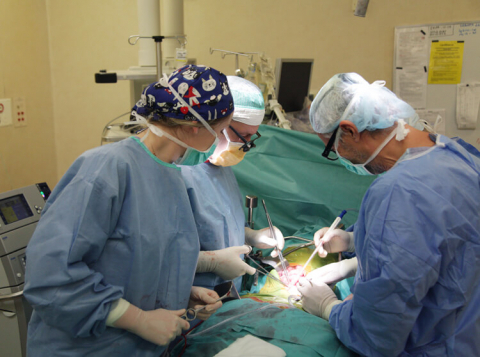The procedure was performed by the following team of transplant surgeons: Professor Wojciech Lisik M.D., Ph.D., Professor Maciej Kosieradzki M.D., Ph.D., Associate Professor Marek Pacholczyk M.D., Ph.D., Paweł Ziemiański M.D., Ph.D., and Paweł Skrzypek M.D. Anaesthesia was provided by Jan Pluta M.D. and Nadia Abukhouskaya M.D. Almost 20 people, including doctors, nurses and support staff, were involved in the surgery. The procedure required 9 hours to complete and was a complete success, as both organs became fully functional directly after the transplantation.
Cystic fibrosis develops usually before puberty and involves many organs. The defective transmembrane chloride transport results in hypovolemia and build-up of thick, viscous secretion which impairs the function of various organs. The clinical manifestation and the course of the disease differs between patients with cystic fibrosis. As medical treatment and results of therapy of non-pulmonary complications, such as liver and pancreatic diseases, improved, most of them are nowadays capable of reaching adulthood.
Diabetes mellitus is the most common non-pulmonary complication of cystic fibrosis. Approx.35-50% of patients with cystic fibrosis develop insulin-dependent diabetes mellitus before they reach the age of 30.
Liver failure and complications of portal hypertension are common indications for liver transplantation in patients with cystic fibrosis. Progressive lung disease may contribute to poor prognosis. Yet, when compared with those who were awaiting transplantation distinct benefit in survival (both for adults and children) after liver transplantation performed due to cystic fibrosis was demonstrated.
Additionally, liver failure is an independent risk factor for cystic fibrosis-related diabetes mellitus. While all liver transplant recipients demonstrate higher risk of developing diabetes mellitus, virtually all patients with cystic fibrosis-related liver disease will eventually develop diabetes mellitus. Therefore, restoring pancreatic function may significantly improve the condition of the patient and the quality of life by reducing the need for both insulin and pancreatic enzyme replacement therapy. It also leads to improved nutrition and reduces the incidence of long-term cystic fibrosis complications, such as microangiopathy.
